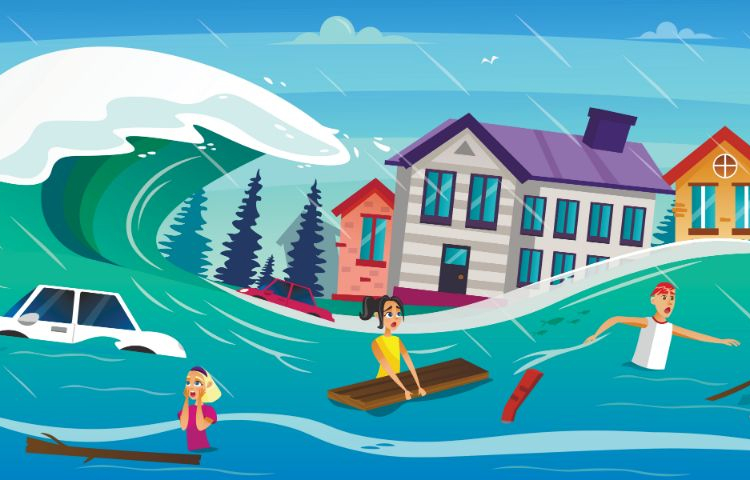Here Are Insurance Covers That Can Protect You Against Rain-Related Damage
Here Are Insurance Covers That Can Protect You Against Rain-Related Damage

Rains are welcome when it makes the weather pleasant. But what about incessant rains? The heavens unleashed a wrathful monsoon upon Northern India that left us all stunned in 2023. From Himachal Pradesh to Delhi, the rain poured and kept pouring, and what followed was nothing short of chaos. Along with many lessons about disaster management, the North India floods also conveyed to us the utmost importance of insurance coverage in mitigating the financial aftermath of such natural disasters. Let's learn how flood insurance can provide a lifeline when floods and landslides turn lives upside down, and the heavens decide to pour down their fury like in the recent North India floods.
Overview of North India Floods
Torrential rains lashed North India in July, inundating Punjab, Haryana, Chandigarh, Himachal Pradesh, Uttarakhand, Jammu and Kashmir, Rajasthan, and Delhi. Considered the wettest season in decades, the two-week torrential rains claimed many lives, washed away vehicles, roads, bridges, homes, and other infrastructure and disrupted essential services. Thousands lost their homes and were evacuated to relief camps in the North India floods. The wrath of rains caused heavy losses to private and public property too. Rivers were in spate and sent alarm bells ringing to the governments of the affected states. Schools, colleges, and offices remained closed.
Understanding Rain-Related Damage
Heavy rains can leave a trail of devastation, throwing normal life out of gear. Let's understand how and what damage can be caused by rain.
• Floods:
One of the immediate effects of heavy rains is flooding. Excessive rainfall can significantly increase water levels of rivers and other water bodies, causing floods in nearby areas and damaging houses, infrastructure, crops, etc. Floods can also lead to loss of life and property.
• Landslides:
Incessant rains can soak the soil, causing landslides in hilly or mountainous regions with steep slopes. Landslides damage roads, structures and natural habitats.
• Soil erosion:
Intense rains can cause soil erosion by washing away the fertile topsoil from agricultural fields. This affects the quality of soil, leading to low productivity of crop yields.
• Contamination of water:
Overflowing sewage systems due to heavy rains can contaminate waterbodies posing risks to the lives of people.
• Damage to infrastructure:
Floods, landslides, and erosion due to heavy rains can cause damage to roads, bridges, buildings, and other infrastructure. Heavy rains can also lead to the collapse of buildings and bridges.
• Disruption of services:
Essential services like electricity, transportation, and communication get disrupted following heavy downpours bringing life to a halt.
• Diseases:
Water-borne diseases become rampant due to the stagnant water, which becomes the breeding ground for mosquitoes and other vector-borne illnesses.
Importance of Insurance Coverage
The first and foremost benefit of insurance coverage is mitigating financial risks by providing security and stability to people in case of an unfortunate incident. An unforeseen crisis can take a toll on your emotional as well as financial health, and in the absence of insurance, you can face severe financial hardship. Having insurance cover will help safeguard against unexpected expenses and provide peace of mind to the policyholder. Whether it is damage to the structure of your home and its contents, vehicle, or a medical emergency, insurance cover has your back. So, if you are still mulling over whether to invest in insurance or not, there are enough reasons to go for it.
Types of Insurance Covers for Rain-Related Damage
Insurance coverage for rain-related damage depends on the type of policy and its terms and conditions. Following are some insurance policies which provide protection against damages due to rain.
1. Home insurance:
Most standard home insurance policies cover damage caused to the structure as well as the contents of the house due to rains. The home insurance policy typically covers loss to the walls, roof, floors, and personal belongings. However, it's better to check your policy regarding the inclusions and exclusions related to rain damage while buying the policy.
2. Renters insurance:
If you are a tenant and think the homeowner's insurance will cover your property too, then you are wrong. Homeowners insurance will protect the structure of the house but not your contents. To protect your personal belongings against rain-related damage, you have to buy tenant or renters insurance.
3. Flood insurance:
Generally, home insurance policies do not cover damage caused due to floods. Flood insurance is an add-on cover you can opt for with your existing home insurance policy. So, if you reside in a flood-prone area, it is advisable to buy a separate flood insurance policy.
4. Motor insurance:
A comprehensive motor insurance policy covers any damage caused to your vehicle due to natural calamities, such as floods, cyclones, heavy rainfall, etc. Insurance will cover the expenditure of repair or replacement of parts. If you or your vehicle sustain any injury/damage in an accident due to potholes and bad road conditions, insurance will cover all the expenses.
5. Health insurance:
With rains come many water-borne diseases and infections. You may need hospitalisation if the condition worsens, and the rising medical expenses can stress you financially. A robust health insurance policy can safeguard your expenses while you focus on your health.
Tips for Choosing the Right Insurance
Whether you are looking for home, motor, health, or any other type of insurance, choosing the right policy is important to ensure adequate financial protection. So, here are some tips to help you buy the best and right insurance policy:
1. Evaluate your needs:
Before you start looking for an insurance policy, assess your needs and how much coverage you require. For instance, if it is health insurance, consider your age, health condition, pre-existing diseases, number of family members, etc., to find a plan that suits you best.
2. Research and compare policies:
This is an important factor. Although it will need some time and effort, it is vital to research the various plans available and compare them based on what they cover, the benefits offered, premiums, etc., to get the best deal.
3. Sum insured:
The sum insured by your insurance policy should be sufficient to cover the costs. A high sum insured will cost more, but the premium should not be the only deciding factor. Adequate protection during an emergency is important.
4. Inclusions and Exclusions:
Before deciding, thoroughly read the policy's terms and conditions to understand what is covered, what is not, and any limitations or conditions. This will help you know if the policy meets your requirements.
5. Consider Deductibles:
A deductible is the amount you need to bear before the insurance coverage kicks in. A high deductible will lead to lower premiums but ensure you are financially sound to pay the high amount in case of a claim.
6. Reputation of the insurance company:
Check the reputation and financial condition of the insurance provider to know if the claims are settled on time and with ease. The insurer should have a high claim settlement ratio, and the claims process should also be smooth and hassle-free.
FAQs
1. Will my home insurance policy cover damage due to floods?
No, most standard home insurance policies do not cover loss caused due to floods. You have to buy a separate flood insurance policy to mitigate the loss. If you live in an area which is at risk of floods, you must consider buying flood insurance. Check with the insurance provider what the policy covers and the exclusions.
2. I tried to take out my car, submerged in flood waters. Will insurance pay for the damage?
When your car is submerged in water, do not try to start the engine or move it from its place. Let it stay put until the insurer sends somebody to check the condition and estimate the damage. If possible, take pictures of your vehicle. If you try to move the car, there are chances of your claim being rejected.
Conclusion
Rains can cause a lot of damage and destruction, as we have seen in the recent North India floods. Staying prepared for such unpredictable fury of nature can save you from financial stress and strain. This becomes all the more important if you live in an area vulnerable to floods, rain, and other rain-related risks. When buying an insurance policy for coverage against rain-related damage, it is vital to know what types of damage are covered and the limits and exclusions to ensure you have the right insurance coverage. A comprehensive home insurance policy or home content insurance can save the day in difficult times.
Disclaimer: The above information is for illustrative purposes only. For more details, please refer to the policy wordings and prospectus before concluding the sales.
RELATED ARTICLES
How to navigate through floods or flash floods?
Water Damage vs Flood Damage: What's the Difference?
Residing in an earthquake, cyclone, flood-prone area? What can I do to ensure I save my losses?
Flood & Earthquake - Safety Tips
Important Checklist for Home Maintenance in Monsoon











 Health Insurance
Health Insurance  Travel Insurance
Travel Insurance  Car Insurance
Car Insurance  Cyber Insurance
Cyber Insurance  Critical Illness Insurance
Critical Illness Insurance
 Pet Insurance
Pet Insurance
 Bike/Two Wheeler Insurance
Bike/Two Wheeler Insurance  Home Insurance
Home Insurance  Third Party Vehicle Ins.
Third Party Vehicle Ins.  Tractor Insurance
Tractor Insurance  Goods Carrying Vehicle Ins.
Goods Carrying Vehicle Ins.  Passenger Carrying Vehicle Ins.
Passenger Carrying Vehicle Ins.  Compulsory Personal Accident Insurance
Compulsory Personal Accident Insurance  Travel Insurance
Travel Insurance  Rural
Rural 












